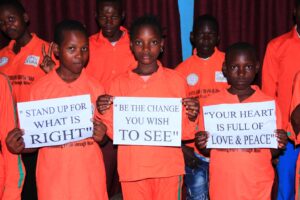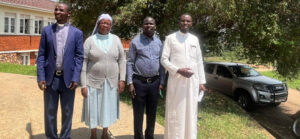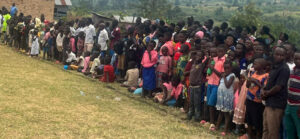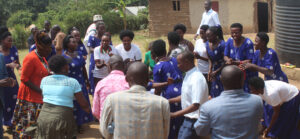Project overview:
The Raising Inter-Faith Youth Voices took an innovative approach of intersecting SRHR with mitigating the effects of climate change. Regarding SRHR, WUFBON ensured that training activities went hand-in-hand with provision of services. Similarly, it ensured that empowering the youth with climate change information would be insufficient without enhancing their green skills. However, the key innovative point was to link SRHR with mitigation of climate change.
Overall, therefore, the project combined information with SRHR services and concrete skills for tackling the effects of climate change at the intersection of SRHR. An important component of the empowerment program was peer education. Through previous projects, WUFBON learned that peer education has a multiplier effect which allows an intervention to reach more beneficiaries and wider sharing of knowledge.
Peer educators included club members and other grassroots based religious and lay leaders. After training them, the project then deployed them to conduct community outreach activities, which served as forums to dispel existing myths, misconceptions, prejudices, negative attitudes, and retrogressive norms. Deep about our methodology employed by the Raising Inter-Faith Youth and Women Voices on Climate Change Adaptation and Family Planning project is summarized herein:
1. Intersection of SRHR and Climate Change Mitigation:
The project creatively combined Sexual and Reproductive Health and Rights (SRHR) with efforts to mitigate the effects of climate change. While addressing SRHR, WUFBON ensured that training activities were closely linked with the provision of services. Recognizing that climate change education alone was insufficient, the project also emphasized enhancing green skills among youth for example the project trained 53 young women solar engineers in installation of home solar systems, solar garden lamps, solar irrigation systems, clean energy cooking stoves fabrication among others..
2. Linking SRHR with Climate Change:
A key innovative aspect was the deliberate connection between SRHR and climate change mitigation. By integrating these two critical areas, the project aimed to create a holistic approach to youth empowerment.
3. Green skills & Peer Education as a Multiplier Effect:
Green skills & Peer education played a pivotal role in the program. Drawing from previous experiences, WUFBON understood that peer educators could significantly amplify the impact of interventions. These peer educators included VSLA (Village saving and Loans Associations) club, SRHR & Green school clubs’ members and grassroots-based religious and lay leaders.
4. Community Outreach Activities:
After training the peer educators, the project deployed them to conduct community outreach activities. These forums served as platforms to dispel existing myths, misconceptions, prejudices, negative attitudes, and retrogressive norms. By engaging with the community, the project aimed to foster positive change and knowledge sharing. In summary, the project strategically combined information, SRHR services, and practical skills to address both SRHR and climate change challenges among youth. Peer education played a crucial role in reaching a wider audience and promoting positive transformation. During outreaches WUFBON used the cultural and religious poems lyrics and sports to engage with young people which increased the community reach since music, dance, drama and sports attracts many people and so we used sports as entry point to increasing communication about population, health environment and development.
Activities:
The Raising Inter-Faith Youth & Women Voices on Climate Change Adaptation and Family Planning project involved a series of inter-related activities. While implementing these activities, WUFBON followed a standard practice of consulting closely with the local stakeholders in every phase of the project from planning, implementation, monitoring, evaluation and documentation of successes, challenges, and lessons. These activities were:
1. Mobilizing and supporting existing VSLA to integrate SRHR & climate change packages in their weekly meetings. VSLA were self-selected groups of people who pooled their resources into a fund from which members could borrow. The money was paid back with interest, thus growing the fund. The activities of the group ran in cycles of one year, after which the accumulated savings and the loan profits were distributed back to the members. VSLAs were implemented across WUFBON programs that stimulated the creation of saving groups within communities. Savings groups were self-managed groups of 15 to 25 people who met regularly to save their money in safe spaces, access small loans, and obtain emergency funds for SRHR commodities like contraceptives, sanitary pads, solar panels, clean energy cooking stoves among other products. The VSLA model enabled youth who had acquired skills in green trades to access startup capital for their green enterprises.
2. Artisans for green skilling for youth and women in green enterprise through the interfaith climate change family planning outreaches (Ekyooto) campfire scale up. Continuous integrated climate change and family planning outreaches were conducted to ensure women, men and youth received accurate FP information and services as well as green skills tutorship during the outreach camps. The 54 youth were linked and trained in green trades among others includes 31 young women solar engineers to conduct solar panel installation, clean energy saving stoves making and solar maintenance skills. We are excited that our 4 youth are able to fabricate clean energy saving stoves. The same youth are the one who will be extending solar panels in the 50 selected health facilities.
3. Climate change and SRHR communication through building knowledge and skills, comprehensive training and information dissemination through cultural poems & folk + Radio talk shows. The project was focusing in climate change and SRHR communication. Cultural poems and folk became an effective way to communicate complex issues like climate change and SRHR. Radio talk shows were also used to reach large audiences and engage them in discussions about these issues. To compliment this activity with additional support for climate justice poems and lyrics from KOSHE was received which also helped us reach greater audience, see annexed case study for detailed information.
Providing high quality, comprehensive services to youth through stocking of Community youth center (Nsinde Eco Tourism and resource Centre) with information which continued to provide short term and long-term climate change and family planning youth fellowships. These activities empowered the local community on ecosystem-based conservation and sustainable community eco-tourism. Core aspects of these activities were preservation of natural environments and wildlife, provision of educational and recreational opportunities for local visitors, and integration of SRHR and climate change adaptation discussions and trainings. This integration allowed participants to link up cultural and religious resources for family planning with efforts to mitigate the effects of climate change and enhanced community resilience.
4. Conducting integrated community outreach and green school, Mosque and church models in Kyarusozi Sub County and Kyenjojo Town Council. The project created green school models that provided healthy environment conducive to learning while saving energy, environmental resources, and money. They prepared students to become leaders and citizens who understood how the natural world works, see the patterns that connect human activity to nature, and have the knowledge, values, and skills to act effectively on that understanding. Integrated community outreach was effective in engaging the communities as it involved working with local organizations and businesses to create a sustainable community.
Some of the sub-activities under this activity were recycling programs, community gardens, and other initiatives that helped reduce waste and promoted sustainability. We are pleased that the district honored commitment to include climate change in the work plan and mainstreamed in all sectors of the local government, this has been evidenced in health sector, education sector, production sector and also the district has planned for and distributed solar irrigation kits to the community schools and household model homes for demonstration of solar irrigation technologies to the rural community as part adaptation and resilience to climate change and Kyongera Parish one of operation was selected as a pilot parish under the presidential model parishes of which avails opportunity for integration of PHED in case the goal of model parish is to be achieved.
5. Supporting health workers to provide youth-friendly sexual and reproductive health services. Youth-friendly services delivered health services to meet the SRH needs of young people. The design allowed services that supported young people’s physiological, cognitive, emotional, and social transition into adulthood. Therefore, the project ensured that Kyenjojo district honored its commitment to establish active youth friendly corners at health facilities and strengthen referral systems. It also allowed the Installation of climate change and FP platforms for sharing massages at faith spaces and health facilities.
6. Conducting quarterly district inter-sector working group engagements on climate change and family planning. The purpose of conducting quarterly district inter-sector working group engagements on climate change and family planning was to coordinate, identify, process, and elevate relevant issues to the district local government and partners for policy decisions and guidance. It also facilitated the operational processes and flow of information between working groups and others for development and implementation of district adaptation plan for climate change.
7. Capacity strengthening for youth and women leader’s climate change & SRHR champions. Capacity strengthening for grassroots climate change and SRHR champions aimed to empower young people and women to become leaders in climate change and sexual and reproductive health and rights (SRHR) advocacy. The activity provided training and resources to help these individuals develop the skills they need to become effective advocates for these issues. The project was designed to help young people and women build their capacity to lead change in their communities and beyond.
8. Training of trainers in men engagement model and scale up of family planning and climate change interventions. The project started by training of trainers in men engagement model and scale up of the family planning and climate change interventions. Evidence from previous interventions showed that increased women’s access to SRHR services had reduced their vulnerability to climate change. Having planned their families and improved their health, they were able to better cope with the effects of climate change. However, those achievements were hampered by inadequate involvement of men in these interventions. Therefore, the project aimed at increasing men’s engagement in SRHR services.
9. Technical review and evaluation of WUFBON’s model, interfaith collaboration, policy advocacy and gender inclusion. WUFBON commissioned a consultant to assess the model and approaches used with a view to assessing their relevance, effectiveness, and possible replication. And findings indicate innovative contribution of our model to to safe guarding natural resources.
Results obtained.
- Result 1: Youth were equipped with the knowledge on SRHR and climate-change mitigation skills to improve their health and preserve their environment.
- Result 2: The project increased access to sexual and reproductive health information and services among the youth.
- Result 3: The project strengthened the commitment and support for adolescent SRHR and climate change education.
- Result 4: The project strengthened vertical and horizontal communication through multi-stakeholder climate action and multi-sector family planning working group (inter-agency coordination).
- Result 5: Stakeholders Adopted Climate Change and SRHR supportive policies.
Completed Project 2023/2024.






